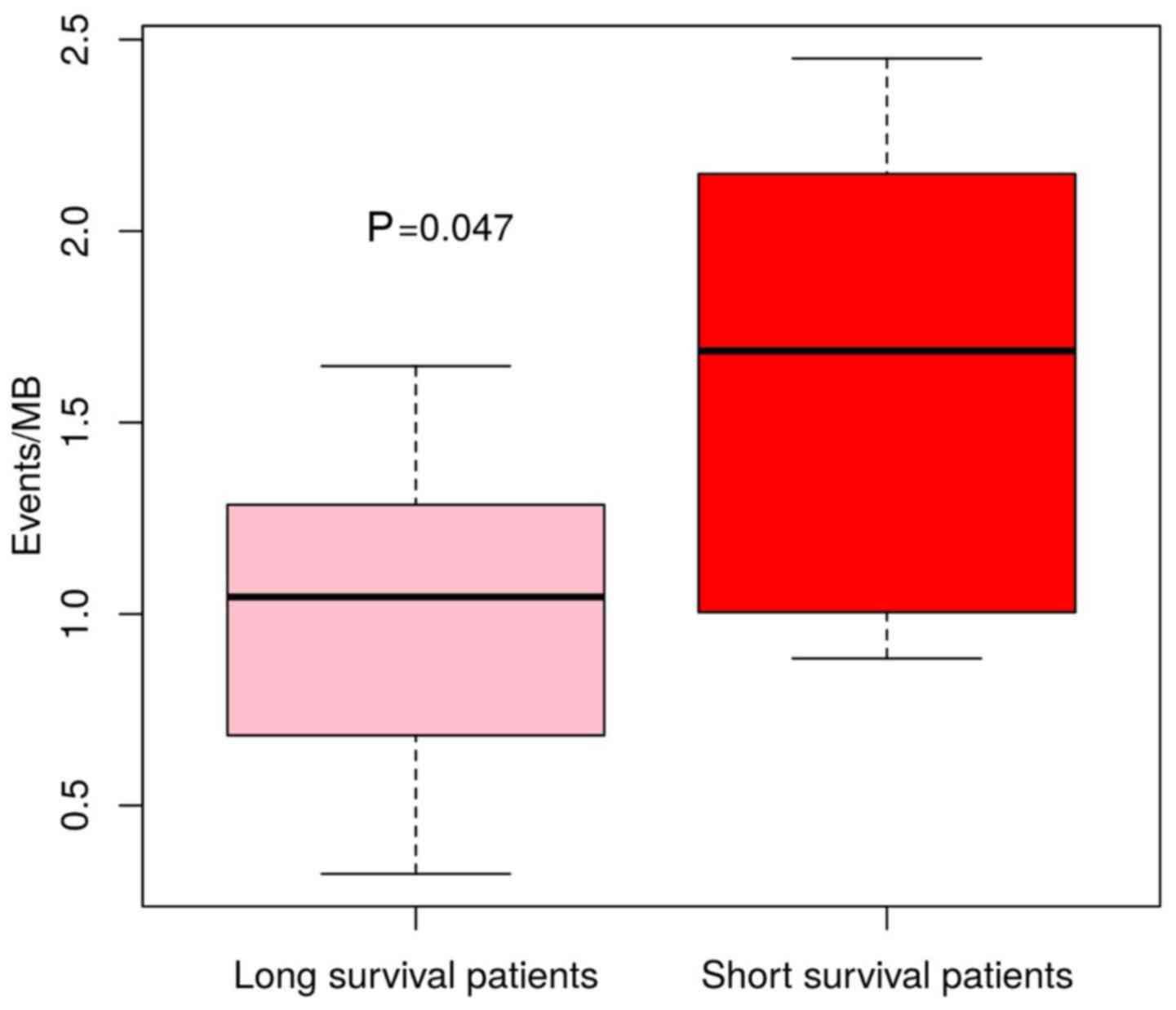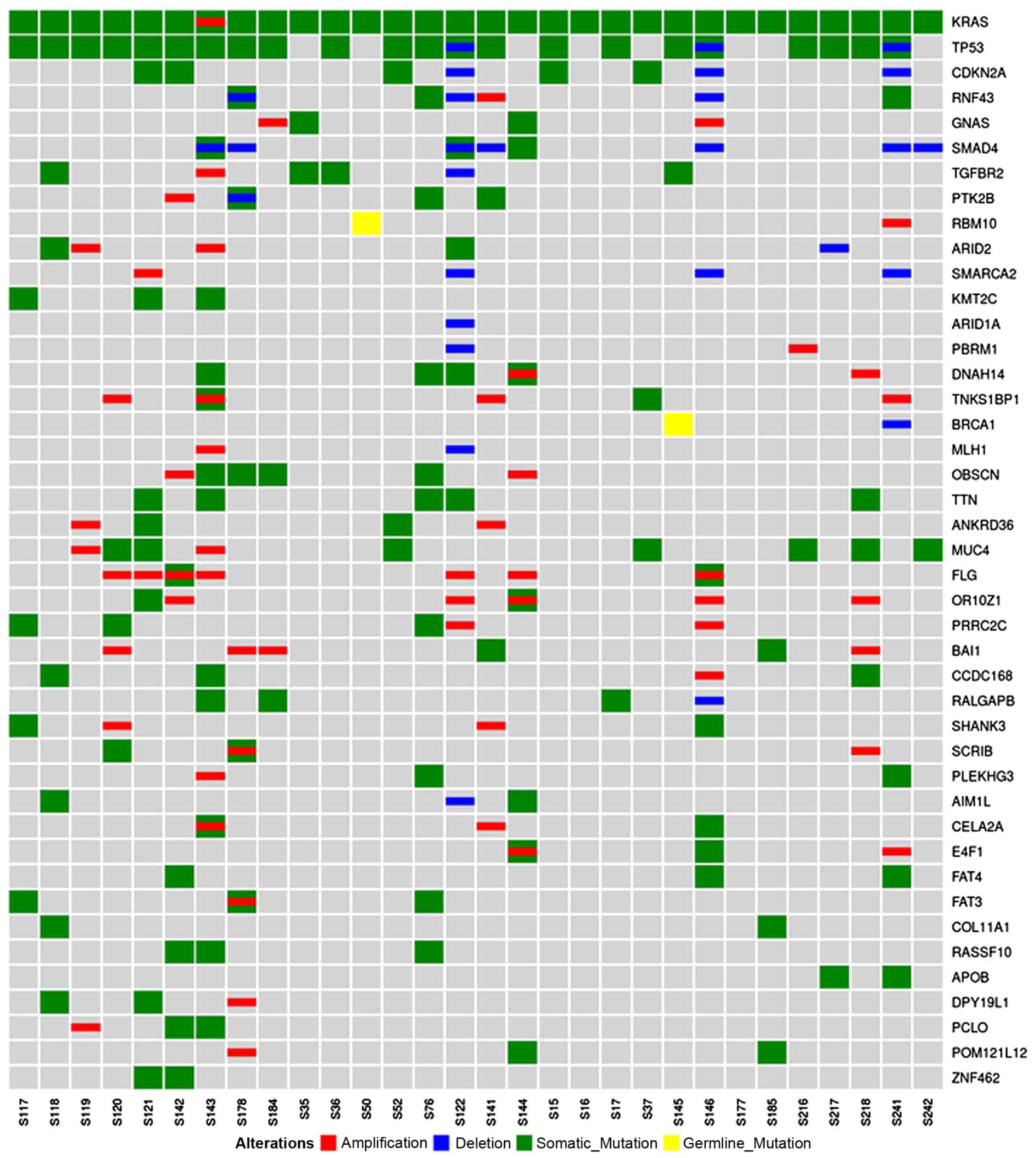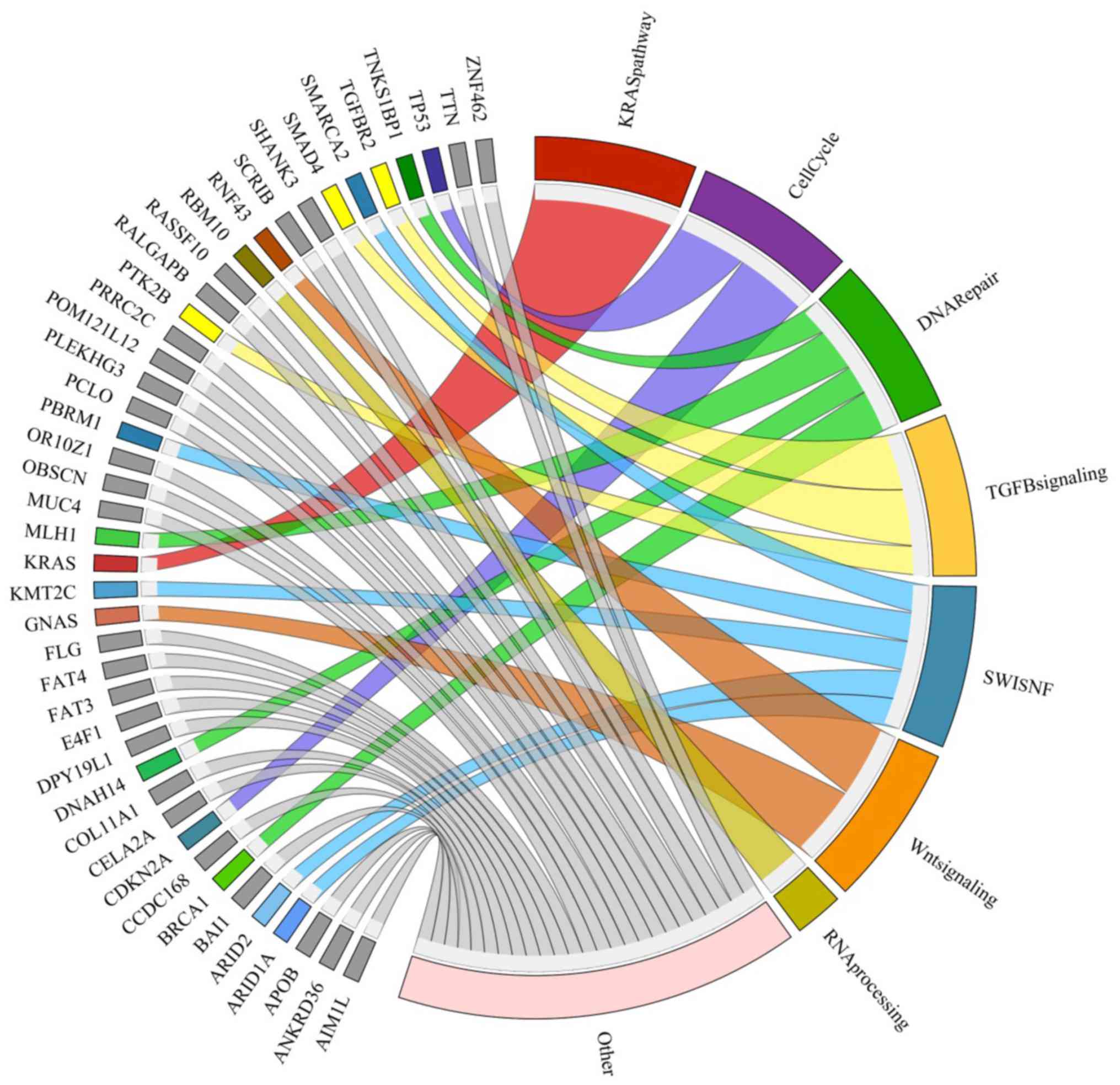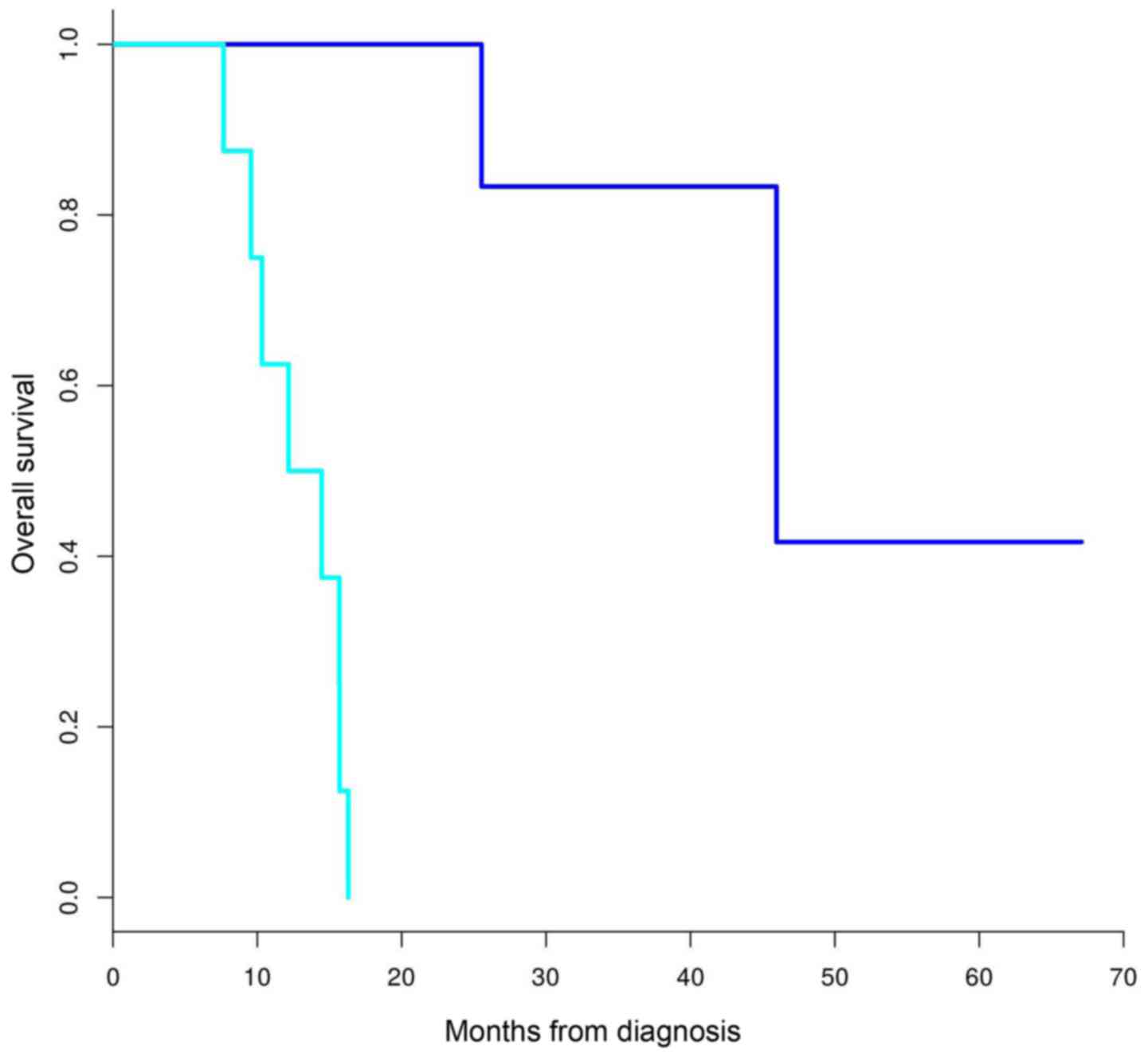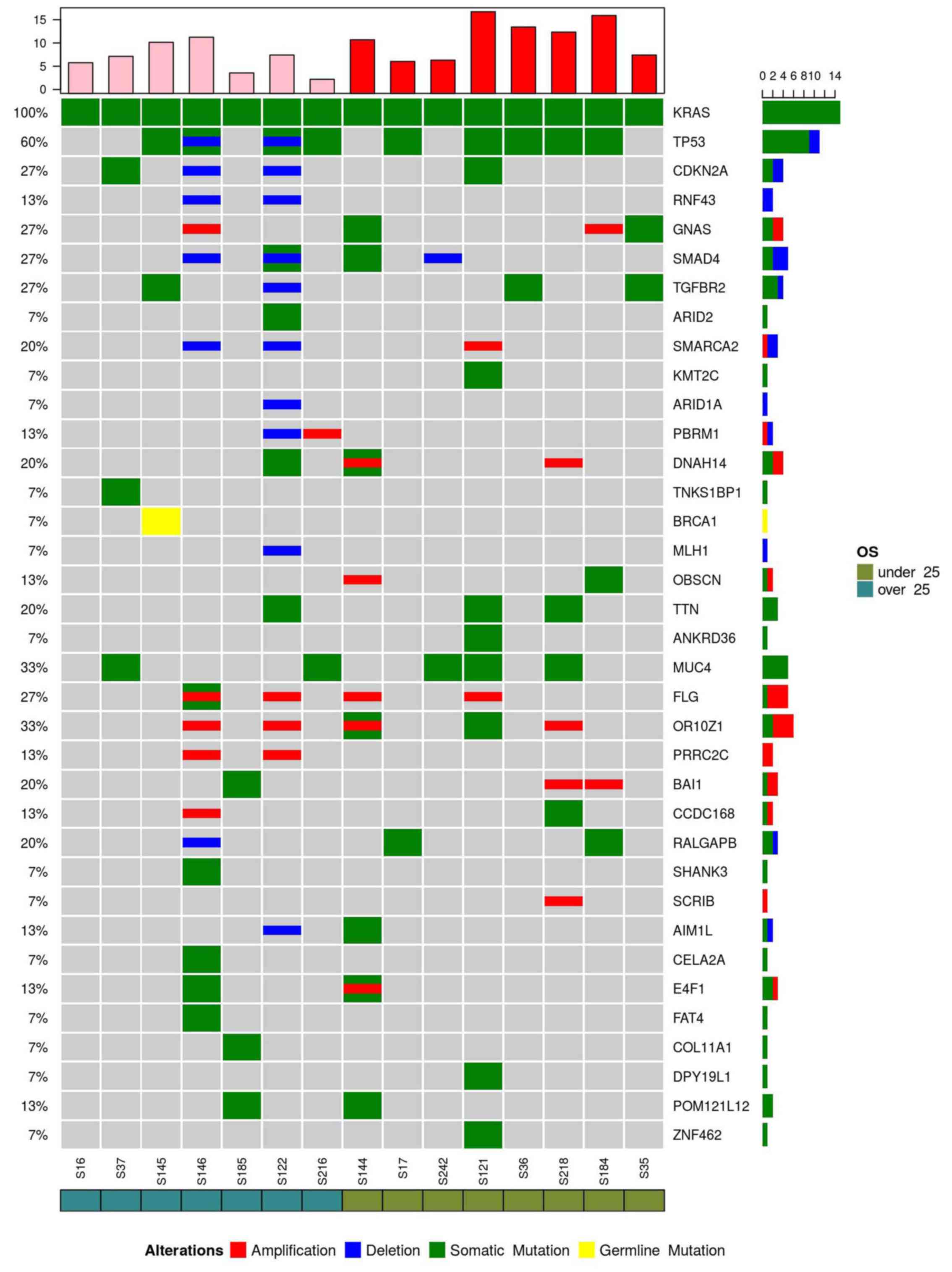|
1
|
Vogelzang NJ, Benowitz SI, Adams S,
Aghajanian C, Chang SM, Dreyer ZE, Janne PA, Ko AH, Masters GA,
Odenike O, et al: Clinical cancer advances 2011: Annual Report on
Progress Against Cancer from the American Society of Clinical
Oncology. J Clin Oncol. 30:88–109. 2012. View Article : Google Scholar
|
|
2
|
Katz MH, Wang H, Fleming JB, Sun CC, Hwang
RF, Wolff RA, Varadhachary G, Abbruzzese JL, Crane CH, Krishnan S,
et al: Long-term survival after multidisciplinary management of
resected pancreatic adenocarcinoma. Ann Surg Oncol. 16:836–847.
2009. View Article : Google Scholar
|
|
3
|
Conroy T, Desseigne F, Ychou M, Bouché O,
Guimbaud R, Bécouarn Y, Adenis A, Raoul JL, Gourgou-Bourgade S, de
la Fouchardière C, et al Groupe Tumeurs Digestives of Unicancer;
PRODIGE Intergroup: FOLFIRINOX versus gemcitabine for metastatic
pancreatic cancer. N Engl J Med. 364:1817–1825. 2011. View Article : Google Scholar
|
|
4
|
Von Hoff DD, Ervin T, Arena FP, Chiorean
EG, Infante J, Moore M, Seay T, Tjulandin SA, Ma WW, Saleh MN, et
al: Increased survival in pancreatic cancer with nab-paclitaxel
plus gemcitabine. N Engl J Med. 369:1691–1703. 2013. View Article : Google Scholar
|
|
5
|
Meyerson M, Gabriel S and Getz G: Advances
in understanding cancer genomes through second-generation
sequencing. Nat Rev Genet. 11:685–696. 2010. View Article : Google Scholar
|
|
6
|
Cancer Genome Atlas Research Network:
Electronic address: andrew_aguirre@dfci.harvard.eduCancer Genome
Atlas Research Network: Integrated Genomic Characterization of
Pancreatic Ductal Adenocarcinoma. Cancer Cell. 32:185–203.e13.
2017. View Article : Google Scholar
|
|
7
|
Jones S, Zhang X, Parsons DW, Lin JC,
Leary RJ, Angenendt P, Mankoo P, Carter H, Kamiyama H, Jimeno A, et
al: Core signaling pathways in human pancreatic cancers revealed by
global genomic analyses. Science. 321:1801–1806. 2008. View Article : Google Scholar
|
|
8
|
Schubert M, Lindgreen S and Orlando L:
AdapterRemoval v2: Rapid adapter trimming, identification, and read
merging. BMC Res Notes. 9:882016. View Article : Google Scholar
|
|
9
|
Lang B, Trapnell C, Pop M and Salzberg L:
Ultrafast and memory-efficient alignment of short DNA sequences to
the human genome. Genome Biol. 10:R252009. View Article : Google Scholar
|
|
10
|
Li H, Handsaker B, Wysoker A, Fennell T,
Ruan J, Homer N, et al: 1000 Genome roject Data Processing
Subgroup. The SequenceAlignment/Map format and SAMtools.
Bioinformatics. 25:2078–2079. 2009. View Article : Google Scholar
|
|
11
|
McKenna A, Hanna M, Banks E, Sivachenko A,
Cibulskis K, Kernytsky A, Garimella K, Altshuler D, Gabriel S, Daly
M, et al: The Genome Analysis Toolkit: A MapReduce framework for
analyzing next-generation DNA sequencing data. Genome Res.
20:1297–1303. 2010. View Article : Google Scholar
|
|
12
|
Cibulskis K, Lawrence MS, Carter SL,
Sivachenko A, Jaffe D, Sougnez C, Gabriel S, Meyerson M, Lander ES
and Getz G: Sensitive detection of somatic point mutations in
impure and heterogeneous cancer samples. Nat Biotechnol.
31:213–219. 2013. View
Article : Google Scholar
|
|
13
|
Goya R, Sun MGF, Morin RD, Leung G, Ha G,
Wiegand KC, Senz J, Crisan A, Marra MA, Hirst M, et al: SNVMix:
Predicting single nucleotide variants from next-generation
sequencing of tumors. Bioinformatics. 26:730–736. 2010. View Article : Google Scholar
|
|
14
|
Wang K, Li M and Hakonarson H: ANNOVAR:
Functional annotation of genetic variants from high-throughput
sequencing data. Nucleic Acids Res. 38:e1642010. View Article : Google Scholar
|
|
15
|
Ramos AH, Lichtenstein L, Gupta M,
Lawrence MS, Pugh TJ, Saksena G, Meyerson M and Getz G: Oncotator:
Cancer variant annotation tool. Hum Mutat. 36:E2423–E2429. 2015.
View Article : Google Scholar
|
|
16
|
Adzhubei IA, Schmidt S, Peshkin L,
Ramensky VE, Gerasimova A, Bork P, et al: Catalog of Somatic
Mutations in Cancer and bioinformatics mutation-prediction tools
PolyPhen2. Nat Methods. 7:248–249. 2010. View Article : Google Scholar
|
|
17
|
Choi Y and Chan AP: PROVEAN web server: A
tool to predict the functional effect of amino acid substitutions
and indels. Bioinformatics. 31:2745–2747. 2015. View Article : Google Scholar
|
|
18
|
Ng PC and Henikoff S: SIFT: Predicting
amino acid changes that affect protein function. Nucleic Acids Res.
31:3812–3814. 2003. View Article : Google Scholar
|
|
19
|
Boeva V, Popova T, Bleakley K, Chiche P,
Cappo J, Schleiermacher G, Janoueix-Lerosey I, Delattre O and
Barillot E: Control-FREEC: A tool for assessing copy number and
allelic content using next-generation sequencing data.
Bioinformatics. 28:423–425. 2012. View Article : Google Scholar
|
|
20
|
Amarasinghe KC, Li J, Hunter SM, Ryland
GL, Cowin PA, Campbell IG and Halgamuge SK: Inferring copy number
and genotype in tumour exome data. BMC Genomics. 15:7322014.
View Article : Google Scholar
|
|
21
|
Collisson EA, Sadanandam A, Olson P, Gibb
WJ, Truitt M, Gu S, Cooc J, Weinkle J, Kim GE, Jakkula L, et al:
Subtypes of pancreatic ductal adenocarcinoma and their differing
responses to therapy. Nat Med. 17:500–503. 2011. View Article : Google Scholar
|
|
22
|
Bailey P, Chang DK, Nones K, Johns AL,
Patch AM, Gingras MC, Miller DK, Christ AN, Bruxner TJ, Quinn MC,
et al Australian Pancreatic Cancer Genome Initiative: Genomic
analyses identify molecular subtypes of pancreatic cancer. Nature.
531:47–52. 2016. View Article : Google Scholar
|
|
23
|
Waddell N, Pajic M, Patch AM, Chang DK,
Kassahn KS, Bailey P, Johns AL, Miller D, Nones K, Quek K, et al
Australian Pancreatic Cancer Genome Initiative: Whole genomes
redefine the mutational landscape of pancreatic cancer. Nature.
518:495–501. 2015. View Article : Google Scholar
|
|
24
|
Di Marco M, Astolfi A, Grassi E,
Vecchiarelli S, Macchini M, Indio V, Casadei R, Ricci C, D’Ambra M,
Taffurelli G, et al: Characterization of pancreatic ductal
adenocarcinoma using whole transcriptome sequencing and copy number
analysis by single-nucleotide polymorphism array. Mol Med Rep.
12:7479–7484. 2015. View Article : Google Scholar
|
|
25
|
Samuel N and Hudson TJ: The molecular and
cellular heterogeneity of pancreatic ductal adenocarcinoma. Nat Rev
Gastroenterol Hepatol. 9:77–87. 2011. View Article : Google Scholar
|
|
26
|
Collins MA and Pasca di Magliano M: Kras
as a key oncogene and therapeutic target in pancreatic cancer.
Front Physiol. 4:4072014. View Article : Google Scholar
|
|
27
|
Biankin AV, Waddell N, Kassahn KS, Gingras
MC, Muthuswamy LB, Johns AL, Miller DK, Wilson PJ, Patch AM, Wu J,
et al Australian Pancreatic Cancer Genome Initiative: Pancreatic
cancer genomes reveal aberrations in axon guidance pathway genes.
Nature. 491:399–405. 2012. View Article : Google Scholar
|
|
28
|
Blackford A, Serrano OK, Wolfgang CL,
Parmigiani G, Jones S, Zhang X, Parsons DW, Lin JC, Leary RJ,
Eshleman JR, et al: SMAD4 gene mutations are associated with poor
prognosis in pancreatic cancer. Clin Cancer Res. 15:4674–4679.
2009. View Article : Google Scholar
|
|
29
|
Shin SH, Kim HJ, Hwang DW, Lee JH, Song
KB, Jun E, Shim IK, Hong SM, Kim HJ, Park KM, et al: The DPC4/SMAD4
genetic status determines recurrence patterns and treatment
outcomes in resected pancreatic ductal adenocarcinoma: A
prospective cohort study. Oncotarget. 8:17945–17959. 2017.
View Article : Google Scholar
|
|
30
|
Urey C, Andersson B, Ansari D, Sasor A,
Said-Hilmersson K, Nilsson J and Andersson R: Low MUC4 expression
is associated with survival benefit in patients with resectable
pancreatic cancer receiving adjuvant gemcitabine. Scand J
Gastroenterol. 52:595–600. 2017. View Article : Google Scholar
|
|
31
|
Jonckheere N, Lahdaoui F and Van Seuningen
I: Targeting MUC4 in pancreatic cancer: miRNAs. Oncoscience.
2:799–800. 2015.
|
|
32
|
Koh YX, Chok AY, Zheng HL, Tan CS and Goh
BK: Systematic review and meta-analysis comparing the surgical
outcomes of invasive intraductal papillary mucinous neoplasms and
conventional pancreatic ductal adenocarcinoma. Ann Surg Oncol.
21:2782–2800. 2014. View Article : Google Scholar
|
|
33
|
Jiang X, Hao HX, Growney JD, Woolfenden S,
Bottiglio C, Ng N, Lu B, Hsieh MH, Bagdasarian L, Meyer R, et al:
Inactivating mutations of RNF43 confer Wnt dependency in pancreatic
ductal adenocarcinoma. Proc Natl Acad Sci USA. 110:12649–12654.
2013. View Article : Google Scholar
|
|
34
|
Brierley JD, Gospodarowicz MK and
Wittekind C: UICC TNM Classification of Malignant Tumours. 8th
edition. Wiley-Blackwell; Oxford: 2016
|















